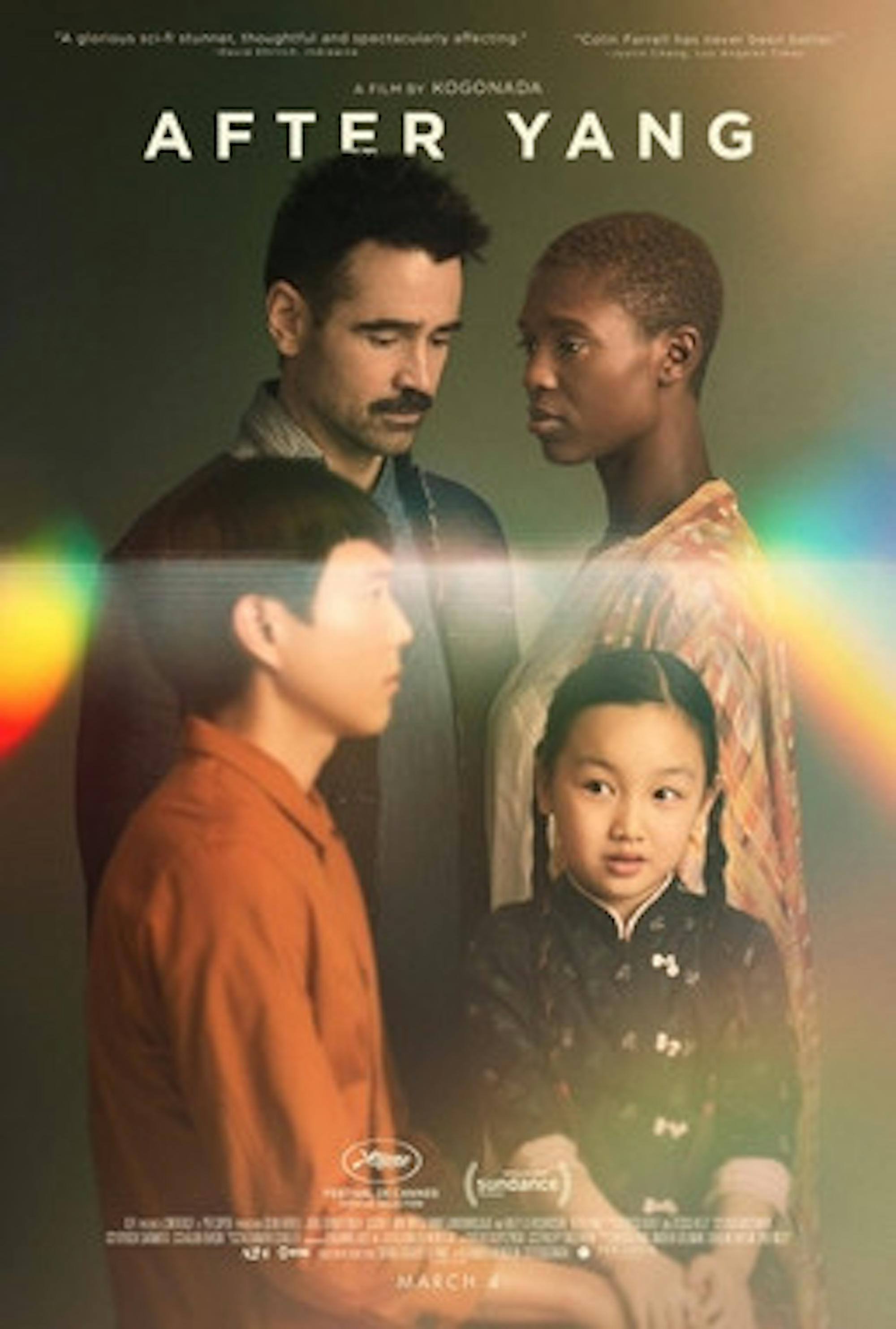The line between robot and human is blurred in A24’s most recent project, “After Yang” (2022), and raises the question: What does it mean to be human, and how far is too far for technological advancement? “After Yang” is set in a futuristic America that many viewers would find appealing — everything seems calm, nature is thriving, technology has made people’s lives much easier and there is an overwhelming sense of harmony in the world. Jake (Colin Farrell) and Kyra (Jodie Turner-Smith) are parents in this futuristic society and have an adopted daughter Mika (Malea Emma Tjandrawidjaja) from China. In this world, it is custom for parents of adopted Chinese children to purchase a ‘technosapien,’ an Asian robot programmed with extensive knowledge of Chinese culture and history, to not only serve as an older sibling or caretaker for the adoptee but to also help the child connect with their birth culture.
The film opens with Jake, Kyra, Mika and the technosapien sibling — Yang (Justin H. Min) — taking a family portrait. There is then a shift, and the family is suddenly in their living room competing in a virtual dance competition against other families around the world. This scene results in bright flashes of color as it cuts from one family to another, each battling to stay in sync with one another and be the last ones standing. Jake’s family is soon eliminated, but Yang cannot stop dancing, and Jake soon realizes he is malfunctioning. For the rest of the film, Jake struggles to find a way to save Yang, as Yang was purchased from a secondhand store that no longer exists, and the warranty is not valid. Along the way, Jake discovers Yang’s memories and learns about the life he did not know Yang had, even as Jake becomes self-aware of how distant he has become from his family.
In 1 hour and 36 minutes, “After Yang” beautifully tackles complex topics such as the line between human and technology, identity, family and loss. Yang’s relationship to his family members is real, despite him being a technosapien, and that is the purpose of the second half of the film’s display of all his memories. The idea that Yang was able to build a relationship with someone outside of his family unit, as his memories show him frequently with Ada (Haley Lu Richardson), and decide what memories were worth keeping in his storage prove that he had consciousness and may be more humanlike than many previously thought. The whole concept of Yang having his own consciousness and memories makes the characters, and the audience, wonder about the nature of humanity.
Alongside the idea of what it means to be human, Mika and Yang attempt to answer the question: What does it mean to be Asian? Both Mika and Yang struggle with their Asian identity, and their individual struggles emphasize the different ways Asian-Americans struggle with their identity. Yang has all this knowledge of Chinese culture but no actual memories of China or what it means to be Asian, as he is a technosapien who has been programmed this way, and grapples with the differences between his racial and ethnic identity. While Yang’s racial identity is Asian, he lacks an ethnic identity as he has never experienced traditional Chinese culture, and the closest he has ever been to another Chinese person is with Mika. On the other hand, Mika comes to terms with what it means to be adopted and how that influences how ‘Asian’ she feels.
In a remarkable scene between Yang and Mika, he attempts to help her understand her Asian and adopted identity. Tjandrawidjaja’s acting in this scene, and throughout the course of the entire film, is incredible and impressive for someone who was less than 10 years old at the time of filming. Reminiscent of a younger McKenna Grace, Tjandrawidjaja acts with such ease and her energy is captivating, which makes it surprising that this is her first major acting role.
“After Yang” showcases the complexity of identity and family and tells an important story of not only what it means to be human but what it means to be Asian — a topic that is not often seen in the media. Though the cast of the film is small, each actor is memorable and brings another layer of emotion to it. In addition, A24 sticks to their reputation of creating films that push the boundaries of cinema and are not afraid to make bold artistic choices, which is exciting to watch. While “After Yang” is a science fiction, utopian-like drama, it does not allow the science fiction aspect to distract from the overall story and message. With a diverse cast, original story and mesmerizing scenes, “After Yang” successfully tells an important story of family that also brings representation to groups that are not often seen on screen.






